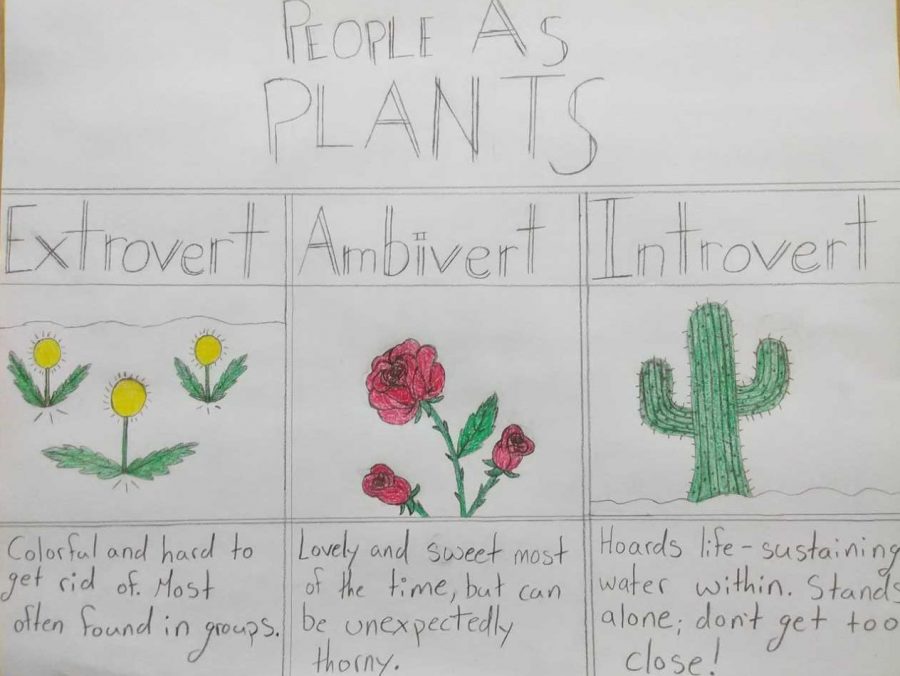Extrovert vs. Introvert
Prowl staffers face off on who has the upper — or lower — hand
Being the Extrovert in Society:
By: Scarlette Mendoza
Extroverts are very open and unreserved people who love attention and get energy just by being around people.
Extroverts seem to feel comfortable in many public situations and don’t shy away from encounters such as seeing someone from school, or being put on the spot.
There are many myths and misconceptions about extroverts. Some of these myths generally talk about how extroverts are typically seen. Although many extroverts are comfortable being around people and voicing their opinions, they don’t need attention to strive.
Some say that extroverts are bad listeners and are always happy. That couldn’t be further from the truth. Many extroverts like to engage in conversation to listen to what the other people are saying and be able to add to the conversation. The conversation may not be in depth like an introvert might prefer. Instead, the conversation will be light.
Perks:
- Group assignments are no struggle because communicating with others is easy.
- It’s common to act before thinking, so when others hesitate on decisions an extrovert just takes the leap.
- They may talk about their thoughts and feelings with others without much hesitation.
It is easy to tell extroverts are outgoing and they sometimes seem to be natural leaders, whether it’s just in their friend group or in school. They can also be quite approachable and enjoy solving problems by talking.
Extroverts also seem to lack a filter. They say what they want when they think it. Loneliness tends to exhaust an extrovert. It saddens and bores them. They regain energy from being around others.
Although a general representation of two types of personalities don’t cover the whole personality of a person, being either one has its perks.
Being the Introvert in Society
By: Joelynn Petrie
High school was built around the idea that everyone should be an extrovert. So it makes it difficult for the introverts to fit in and function in school.
“One highly successful venture capitalist who is regularly pitched by young entrepreneurs told me how frustrated he is by how his colleagues’ failure to distinguish between good presentation skills and true leadership ability. “I worry that there are people who are put in positions of authority because they are good talkers, but they don’t have good ideas,” he said. “It’s so easy to confusing schmoozing ability with talent.””
– Susan Cain (Quiet, 52)
In school we are required to interact with people, think fast and speak loudly. These are all challenges for introverts. When placed into a social environment, it causes them to tire more quickly; compared to an extrovert who gains energy from social settings. This makes school a tiring experience, leading introverts to appear grouchy and rude. In actuality most aren’t. Also, we naturally take longer to process things making it harder to keep up with the extroverts who are willing to spit out ideas on the spot. To make it even harder we usually have quiet voices and don’t like raising our voices. That makes participating in group discussions near impossible.
“When a flower doesn’t bloom you fix the
environment in which it grows, not the flower.”
– The Vibrant Mind
Since school is designed almost to go completely against introverts, we have to deal with either constant nagging from peers and teachers to participate more/talk more, and/or being told that we aren’t doing enough. That won’t fix anything. We are who we are and we can’t change that even if we tried. So instead of telling us that we need to change, listen to the quote above and change the environment in which we are supposed to grow.
Taking Care of Your Introvert 101:
Water them daily. And give plenty of sunshine. Just kidding. (Although water is a great way to get out of socializing)
- Respect their privacy.
- Do not embarrass them (in public).
- Give them time to respond. Don’t demand instant answers; they take longer to process things.
- Do NOT interrupt them. If they get a thought rolling, don’t stop them. They will forget it and/or feel very flustered if you interrupt.
- Give warning of change in their life. Don’t make them spontaneously change from activity to activity. Introverts don’t like change so when it comes they like to be prepared.
- Reprimand them privately (it is embarrassing)
- Teach them new skills privately (again embarrassment)
- Give them one person they can always talk to/ be with (encourage relationship, if healthy, even if that person moves)
- Don’t push them to make lots of friends
- Respect their introversion. Don’t try to change them. Realize it is not just a personality trait; it’s a nervous system setting.
- Appreciate the fact they will know you more deeply than anyone. Introverts prefer deep conversations to small talk.
- Will need/want one-on-one time with you.
- Allow them time alone, guilt free. They need time to recharge and they can only do that by being alone.
- When stressed or tired they need extra support and rest. Don’t give them hard time about wanting to leave a social setting.
- BE KIND; INTROVERTS ARE REALLY HARD ON THEMSELVES, EVEN WHEN YOU’D NEVER GUESS IT. (whisper shouting…)

































